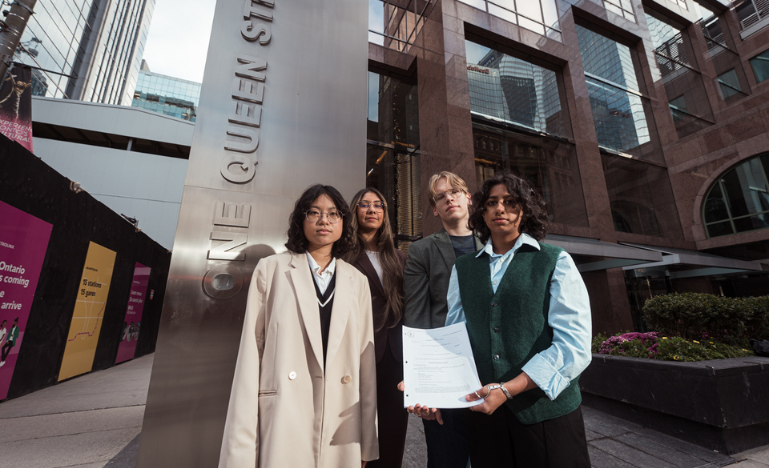Des jeunes plaignants poursuivent en justice Investissements RPC pour mauvaise gestion des risques climatiques
Il s’agit de la première fois qu’un investisseur canadien est poursuivi pour avoir sous-estimé et omis de divulguer des impacts dangereux liés au climat

Un recours d’un nouveau type visant le plus grand gestionnaire de fonds de pension du Canada pourrait établir un précédent pour la façon dont les fonds d’investissement traitent les changements climatiques, estiment des spécialistes.
Plus tôt cette semaine, quatre jeunes personnes ont déposé une plainte devant la Cour supérieure de l’Ontario, alléguant qu’Investissements RPC viole son devoir légal en exposant les cotisations du Fonds du RPC à un risque de perte injustifié du fait des changements climatiques.
« Il s’agit vraiment des risques financiers liés aux changements climatiques », déclare Me Karine Peloffy, juriste chez Ecojustice, qui représente les plaignants aux côtés du cabinet Goldblatt Partners LLP.
« Ce n’est pas une question d’être “sympa”, ce n’est pas de la politique, ce n’est pas une question d’apparences. Il s’agit de l’obligation légale réelle de gérer les risques matériels des changements climatiques. »
La plainte soutient qu’en sous-estimant et en omettant de divulguer les impacts dangereux liés au climat, Investissements RPC met en péril les perspectives de retraite des jeunes cotisants. Cela inclut les quatre plaignants, qui ne prévoient pas de prendre leur retraite avant 2050. Cette date coïncide avec celle fixée par de nombreuses entités pour atteindre la carboneutralité — bien qu’Investissements RPC ait abandonné cet objectif en mai 2025.
L’affaire marque la première fois qu’un investisseur canadien est poursuivi pour mauvaise gestion des risques climatiques. À l’échelle mondiale, c’est également la première action en matière climatique contre un gestionnaire de fonds de pension reposant sur le devoir d’impartialité et d’équité dans un contexte intergénérationnel.
Selon l’affaire intentée, Investissements RCP omet d’évaluer adéquatement deux catégories de risques : d’une part, les risques physiques auxquels le portefeuille est exposé et, d’autre part, les risques climatiques. Le litige porte principalement sur la modélisation climatique utilisée par l’institution pour effectuer ses analyses.
Dans son plus récent rapport annuel, le conseil d’Investissements RPC indique avoir eu recours à un outil d’évaluation du risque climatique, désigné sous le nom de MSCI Climate Value-at-Risk model. Selon ce rapport, ce modèle estimait un impact négatif potentiel pouvant atteindre jusqu’à 4 % de la valeur marchande du fonds dans un scénario dit de « planète à effet de serre » (c’est-à-dire correspondant à une hausse des températures supérieure à trois degrés Celsius).
Ce modèle a toutefois fait l’objet de critiques dans d’autres contextes, certains experts estimant qu’il sous-évalue les risques auxquels sont exposés les portefeuilles d’investissement et les avoirs des régimes de retraite. Selon Me Peloffy, l’outil ne tient pas compte des points de bascule, des effets de second ordre ni d’autres formes de risques systémiques.
« Lorsqu’Investissements RPC a eu recours à cet outil, à notre avis, il n’a pas exercé le jugement prudent et éclairé qui s’imposait », soutient-elle.
S’agissant du risque climatique, la plainte allègue que la poursuite des investissements d’Investissements RPC dans des entreprises prévoyant l’expansion de la production d’hydrocarbures accroît la probabilité d’un changement climatique catastrophique, constituant ainsi un risque pour le portefeuille.
« Par conséquent, nous alléguons qu’il est légalement interdit à Investissements RPC de contribuer à de tels changements climatiques, en raison du risque de perte injustifié que cela comporte », affirme Me Peloffy.
Vers une économie alignée sur une planète habitable
Me Murray Gold, associé principal au sein du groupe Pensions et avantages sociaux chez Koskie Minsky LLP, estime que les conditions sont désormais réunies pour qu’un tel dossier se pointe, dans un contexte où la pression s’intensifie en faveur d’une économie compatible avec une planète habitable.
Selon Me Gold, l’un des devoirs fondamentaux du fiduciaire en matière d’investissement est le devoir de prudence, lequel impose de trouver un juste équilibre entre les risques identifiés et les rendements potentiels. Les risques climatiques, qu’il s’agisse de risques physiques ou de risques découlant de la réponse humaine, notamment des politiques soutenant la décarbonisation ou des avancées technologiques, font « simplement partie de cet ensemble », précise-t-il.
Les fiduciaires de régimes de retraite ont également l’obligation d’agir dans l’intérêt supérieur de l’ensemble des cotisants et des bénéficiaires. Étant donné que nombre d’entre eux ne prendront leur retraite que dans plusieurs décennies — période au cours de laquelle les risques climatiques iront croissant — Me Gold dit que les cotisants plus jeunes sont en droit d’exiger qu’Investissements RPC adopte un horizon de placement à long terme dans ces investissements.
Tout comme la plainte reproche à Investissements RPC un recours aux modèles climatiques inadéquats, une préoccupation plus large émerge quant à la dépendance excessive des fonds de pension à des outils de modélisation qui ne tiennent pas compte de l’ensemble des conséquences potentielles du réchauffement planétaire.
« On ne peut pas se fier à ces modèles pour évaluer les répercussions des changements climatiques dans un contexte d’émissions continues, dans un cadre qui prône le statu quo. C’est tout simplement erroné d’agir ainsi », dit Me Gold.
De manière générale, les fonds de pension s’appuient sur des données historiques pour évaluer les risques, explique-t-il. Or, cette approche se révèle inadéquate dans le contexte climatique, puisqu’il n’existe actuellement aucun modèle capable de reproduire fidèlement les conditions d’un monde caractérisé par des concentrations de gaz à effet de serre sans précédent dans l’histoire humaine.
Une école de pensée émergente suggère que les décisions en matière d’investissement ne devraient pas être prises sur la seule base de modèles, mais sur une vue plus prudente de l’avenir.
« Lorsqu’on évolue dans un monde où l’on ignore encore toutes les conséquences de nos actions, mais où l’on sait qu’elles peuvent être extraordinaires, alors on fait preuve de prudence », dit-il.
Pas de retraite assurée sur une planète instable
Me Carol Liao, présidente de la Canadian Climate Law Initiative et codirectrice du Centre for Climate Justice de l’Université de la Colombie-Britannique, dit que cette affaire montre que le changement climatique ne relève pas d’une simple question éthique lointaine. « Investir dans un climat stable n’est pas seulement compatible avec les obligations fiduciaires : c’est essentiel pour les respecter. Il n’y a pas de retraite assurée sur une planète instable. »
Me Liao souligne qu’il est raisonnable pour les jeunes, qui, comme tous les cotisants à la RPC, n’ont pas le choix de contribuer, de s’attendre à ce que leurs cotisations soient investies de manière responsable. « Je trouve inconcevable de demander aux jeunes Canadiens de financer leur propre insécurité par des investissements qui compromettent leur avenir », affirme-t-elle.
Selon elle, les implications de cette affaire dépassent largement le cadre du seul RPC. Tout portefeuille d’investissement important est soumis à la même exigence légale et morale : veiller à ce que le capital investi ne fragilise pas les conditions de stabilité humaine et économique. « Tout investisseur s’appuyant sur une modélisation erronée ou sous-estimant les risques systémiques liés au climat pourrait se voir confronté à des allégations similaires de mauvaise gestion », prévient Me Liao.
La plainte ne vise pas à obtenir des dommages-intérêts. Me Peloffy explique que l’objectif est que le tribunal reconnaisse qu’Investissements RPC contrevient à ses obligations légales en ne parvenant pas à identifier et à gérer les risques climatiques. « C’est la première étape vers la protection des fonds du Régime de pensions du Canada pour l’ensemble des Canadiens », souligne-t-elle.
Dans un communiqué publié sur son site web, Investissements RPC soutient que les changements climatiques comportent à la fois des risques financiers et des opportunités. « Nous intégrons des facteurs importants liés aux changements climatiques, dans les processus de placement et de gestion du risque à l’échelle des catégories et des régions où nous communiquons de façon importante avec les sociétés pour protéger et faire croître la valeur, et investissons là où la transition et la résilience peuvent créer des rendements à long terme », précise l’institution.
Le gestionnaire a également précisé qu’une action contre Investissements RCP est une action contre la sécurité de la retraite de 22 millions de Canadiens. « Nous avons l’intention de faire tout ce qui est nécessaire pour défendre leurs intérêts. »
Cependant, les défenseurs soutiennent que l’affaire pourrait préserver l’avenir. Ils notent que d’autres fonds de pension, y compris La Caisse de dépôt et placement du Québec (le deuxième gestionnaire de fonds de pension au Canada après Investissements RCP), ont trouvé des moyens de se tourner vers des investissements plus favorables au climat.
« D’autres institutions financières font mieux », observe Me Peloffy.
« Faire mieux est donc possible. »


